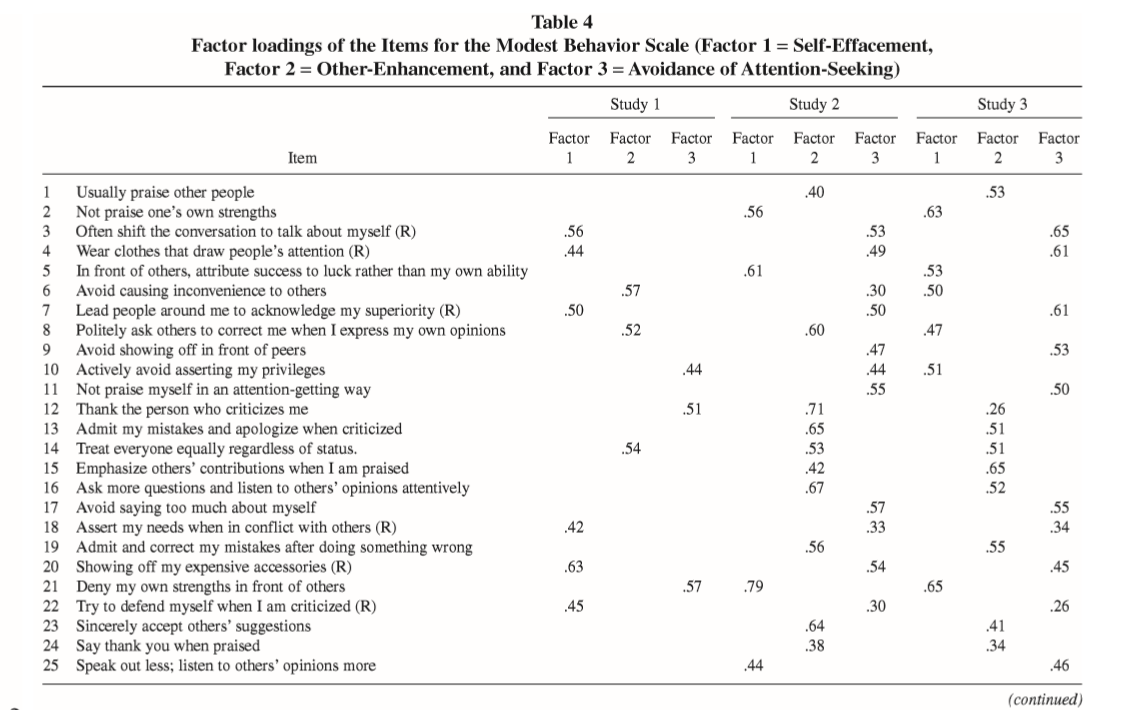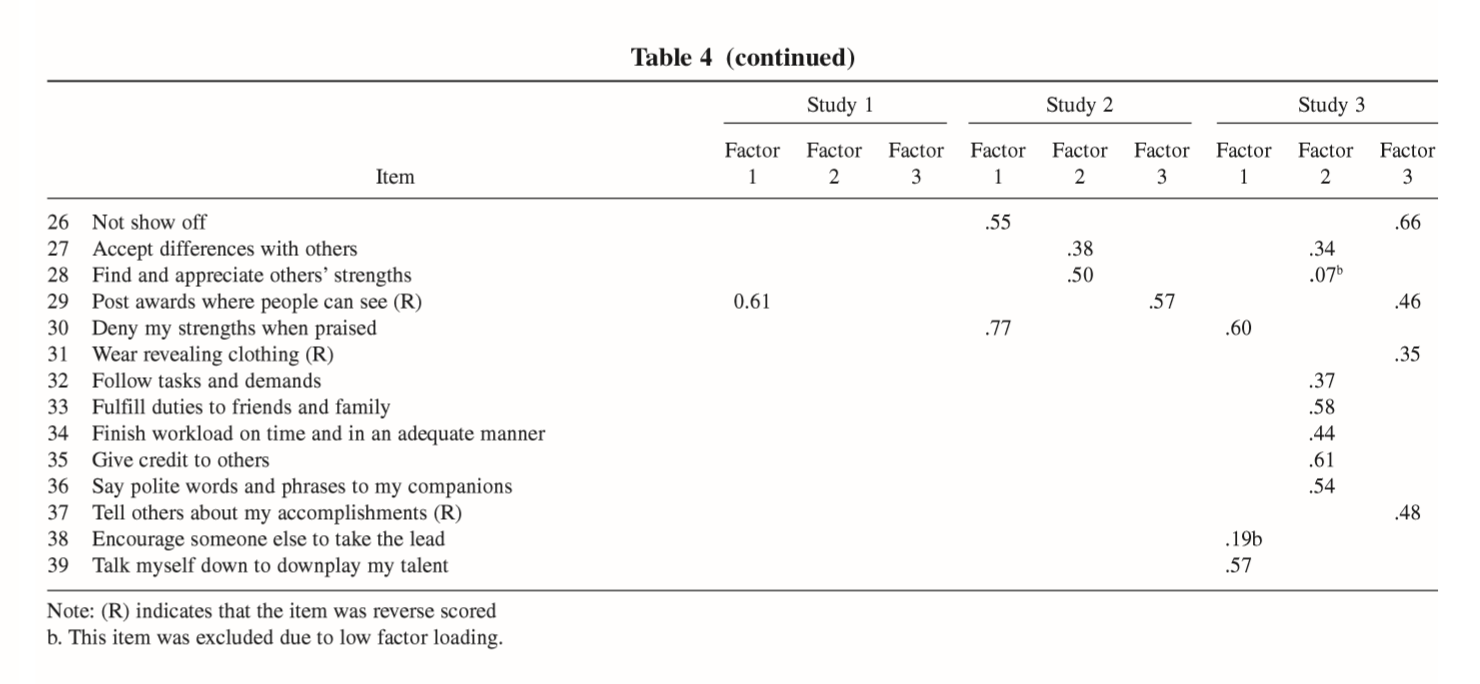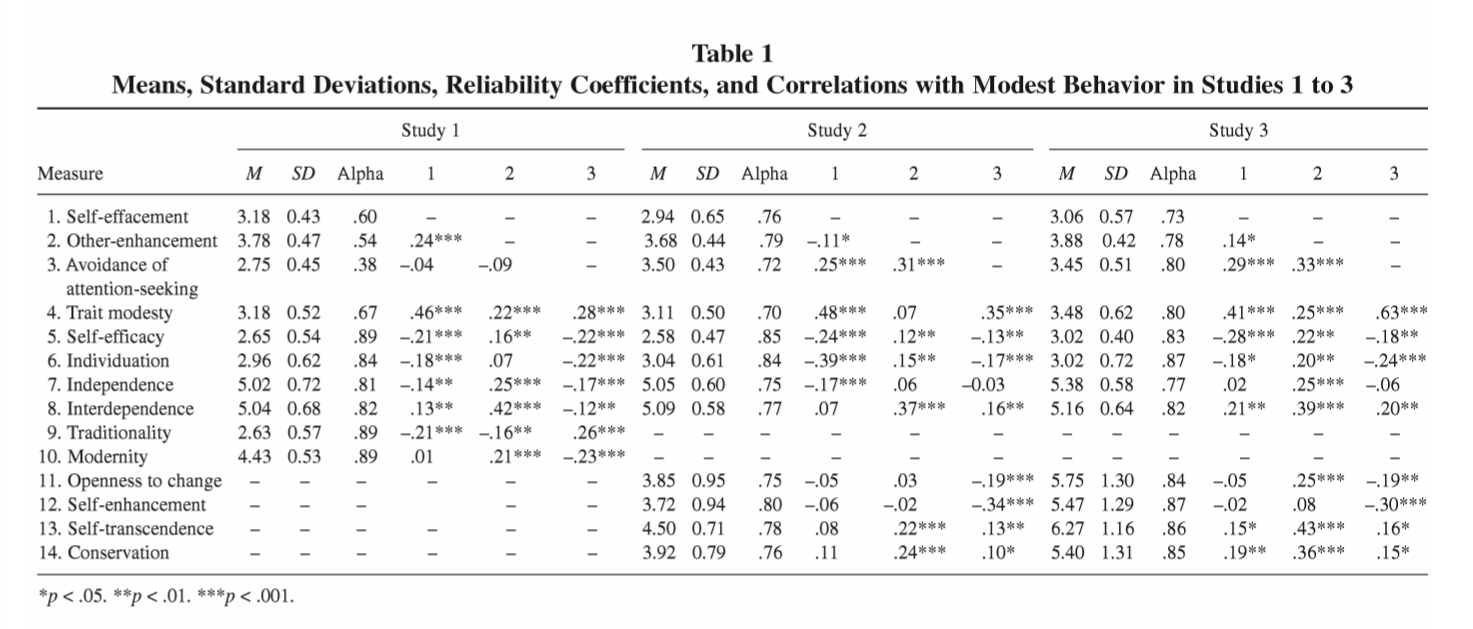谦虚行为量表( Modest Behavior Scale, MBS)
1 Usually praise other people
2 Not praise one’s own strengths
3 Often shift the conversation to talk about myself (R)
4 Wear clothes that draw people’s attention (R)
5 In front of others, attribute success to luck rather than my own ability
6 Avoid causing inconvenience to others
7 Lead people around me to acknowledge my superiority (R)
8 Politely ask others to correct me when I express my own opinions
9 Avoid showing off in front of peers
10 Actively avoid asserting my privileges
11 Not praise myself in an attention-getting way
12 Thank the person who criticizes me
13 Admit my mistakes and apologize when criticized
14 Treat everyone equally regardless of status
15 Emphasize others’ contributions when I am praised
16 Ask more questions and listen to others’ opinions attentively
17 Avoid saying too much about myself
18 Assert my needs when in conflict with others (R)
19 Admit and correct my mistakes after doing something wrong
20 Showing off my expensive accessories (R)
21 Deny my own strengths in front of others
22 Try to defend myself when I am criticized (R)
23 Sincerely accept others’ suggestions
24 Say thank you when praised
25 Speak out less; listen to others’ opinions more
26 Not show off
27 Accept differences with others
28 Find and appreciate others’ strengths
29 Post awards where people can see (R)
30 Deny my strengths when praised
参考翻译:
1通常赞美别人
2不夸耀自己的长处
3经常转移话题到自己身上(R)
4穿着引人注目的衣服(R)
5在别人面前,将成功归功于运气而不是自己的能力
6避免给他人带来不便
7引导我周围的人承认我的优越性(R)
8当我表达自己的意见时,礼貌地请别人纠正我
9避免在同龄人面前炫耀
10主动避免主张自己的特权
11不以引人注目的方式称赞自己
12感谢批评自己的人
13承认自己的错误并在受到批评时道歉
14不分身份平等待人
15当受到赞扬时,强调别人的贡献
16多问问题并专心聆听别人的观点
17避免过多地谈论自己
18与他人发生冲突时坚持自己的主张(R)
19做错事后承认并改正错误
20炫耀自己的昂贵配饰(R)
21在别人面前否认自己的优点
22受到批评时尽量为自己辩护(R)
23真诚接受他人的建议
24被赞美时说谢谢
25少说话,多听别人的意见
26不炫耀
27接受与他人的差异
28发现并欣赏他人的长处
29把奖状贴在别人可以看到的地方(R)
30被称赞时否认自己的优点
Responses were anchored on a 5-point Likert scale ranging from 1 (strongly disagree) to 5 (strongly agree).
Factor 1 = Self-Effacement(M±SD:2.95±0.65)自谦
2、5、21、25、26、30
The items loading on this factor tapped restraint in pursuing self-interest, and could be termed self-effacement.
Factor 2 = Other-Enhancement(M±SD:3.68±0.44)抬高他人
1、8、12、13、14、15、16、19、23、24、27、28
This factor encompassed items involving the expression of concern for others and their elevation of others, and so was labeled other-enhancement.
Factor 3 = Avoidance of Attention-Seeking(M±SD:3.50±0.43)低调
3、4、6、7、9、10、11、17、18、20、22、29
Items loading on this factor pertained to avoiding self-promotion and self-aggrandizement in public, so it was thus named avoidance of attention-seeking.
The reliability coefficients for the three factors were .76, .79, and .72
A total of 405 college students participated in the second study, with 206 (106 males and 100 females) from the Chinese University of Hong Kong, and 199 (106 males and 93 females) from Beijing Normal University, China.



注意:以上表格仅仅关注study2即可。study3样本不是中国人。
参考来源:
Xiaohua Chen, S., Bond, M. H., Chan, B., Tang, D., & Buchtel, E. E. (2009). Behavioral Manifestations of Modesty. Journal of Cross-Cultural Psychology, 40(4), 603–626.

加入心理学网,获得更多
无论您想服务网友,还是想获取帮助(如批量调查或测试),可以微信/QQ:57762787